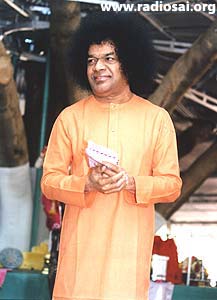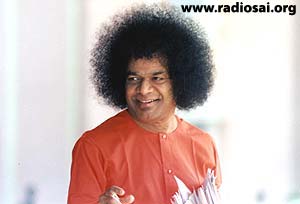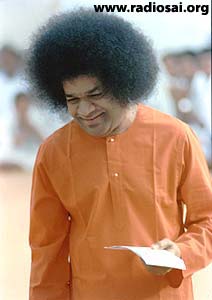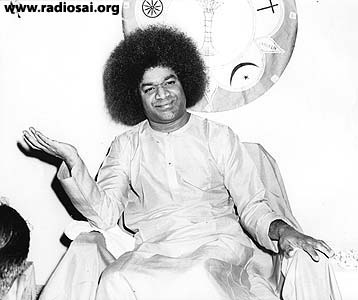 |
 |
 |
Volume
6 - Issue 07
JULY - 2008 |
CONVERSATIONS WITH SAI Satyopanishad - part 6:
CHAPTER 2 - TRENDS IN SOCIETY Anil Kumar: Swami! As we think of the way in which our life is going, we find it confusing and disheartening. We also doubt if it is going in the right direction or not. You are our only refuge. Kindly guide us. Bhagavan: You know mrdangam, the South Indian musical instrument, which like a drum, has to be beaten on both the sides as you play. Your life is like a rat caught in that mrdangam. If the mrdangam is beaten on one side, the rat runs to the other side, and vice versa, as there is no way out for it. Similarly, having been fed up with this world, you think of God. When God tests you, you again drift towards the world. Your movement between the world and God is like that of the rat. This is not the proper way.
A small example: Two students competed with each other in a tournament of eating bananas. One student wanted to eat the outer skin of every fruit first so that he could finish eating the soft pulp part next. The other student planned to eat the soft part first and the skin next. Accordingly, they started eating. The first student having eaten the outer skin of every fruit first had his belly full of that stuff and he could not eat any sweet pulp. So he was defeated, and suffered from stomach ache and indigestion. The second student ate a belly full of the pulp of every fruit, and hence couldn't eat the skin of the fruits. So, he too lost in the competition. All the same, he remained healthy. Similar is the case with those people who are after worldly desires and sensual pleasures. They will have to end their lives in misery finding no cure for bhavaroga, the ailment of worldly attachment. This is equal to the condition of the first student who ate only the outer skin of the banana first in the tournament. But those who think of God are like the second student who ate the soft pulp. They grow stronger in divine life. Life should start from the point of dasoham, ‘I am your servant’. Fill its middle with the relentless enquiry, koham, "Who am I?" End it with full awareness of the identity of the individual self with God ‘soham’, ‘I am God’. This is the correct way of life. Man should realise that the happiness and peace he essentially needs are not present in this mundane world. A simple example: A person went to a hotel. The waiter asked him, "What shall I serve you?” The person said, "I want idli and sambar". Then the bearer, taken by great surprise, said, "What Sir! Have you not seen the board hanging over there! This is a military non-vegetarian hotel, Sir!" Likewise, how can you expect items like Palav, Biriyani and chicken in an Udupi Brahmin vegetarian hotel? In the same manner, there is a board attached to this world, anityam asukham lokam, meaning "This world is temporary and full of misery.” How then do you expect peace and happiness in this world? That is why in the Bhagavad Gita, Lord Krishna says, mam bhajasva, meaning, 'Think of Me, or worship Me, or be immersed in Me, or surrender to Me'. You should lead your life in full knowledge of these facts. Anil Kumar: Swami! How should we conduct ourselves socially? What are social norms? Bhagavan: You should forget two things: the help you have given to others and the harm others have done to you. Moreover, you should remember two things: the help that others have given to you and the harm you have done to others. Then there will be no ego, pride, jealousy, envy, hatred, and other evil tendencies in you.
You should also note another important thing. However small a fault or mistake there is in you, take it as something big. At the same time, when you notice a big mistake in others, you should consider it as a very small one. Take your own goodness as tiny and that of others as mighty. This attitude helps you to correct yourself, improve yourself, and enables you to forgive and forget the lapses of others. But, what happens today is quite the opposite. Everyone magnifies his own goodness and minimises that of others, considers his own Himalayan blunders as small as an anthill, while he gives Himalayan magnitude even to the smallest mistakes of others. This is the cause of all conflicts and infighting. There are still two more extreme categories of people. Some of them portray their lapses as merits, project their mistakes as right things, and try to focus on their virtues, which are actually missing in them. Then, there is the last category of people who are even worse than demons. These are the people who attribute faults, mistakes, and defects to others, which are all false, and totally ignore their merits. Correct your own mistakes first. Judge others by their merits and not by their faults. Seek out your own faults and others' merits. Anil Kumar: Swami! Many people feel that they are too busy to have rest. How, then, is one to take rest? Bhagavan: Change of work is rest. You should never be idle. You should not be lazy. Laziness is rust and dust that ultimately bursts. But work is rest and best. If you are tired of a particular piece of work, change to another. Change of work is rest. Anil Kumar: Swami! We worry a lot. Sometimes we fall sick also due to worry. What is worry? Please tell us how not to worry?
Bhagavan: In my opinion, there is nothing like worry. If you enquire in depth, you will know that there is no worry at all in this world. It is merely psychological. Worry is mentally created fear. That is all! Nothing more! It is all your imagination. At times you feel guilty. So, you worry remembering your past, which is beyond recovery. By no effort can you recover it. Past is past. Then, why worry about the past? Is there any sense in it? You may worry about the future. This is also useless in my opinion. Why? Because the future is uncertain, anything may happen. Who knows? The future is unknown. Why, then, should you worry about the future? What do you gain by that? Understand clearly that everything is in the present. It is not simple present, it is omnipresent. How? In the present lie the results of the past. The present is the foundation of the future. The seed of today is out of the tree you grew yesterday, and it will germinate and grow into a tree tomorrow. So, worry is useless. Hence, never worry about anything. Anil Kumar: Swami! Nowadays many educated people waste their time, money and energy in towns and cities. Bhagavan, we are eager to know your views on this subject. Bhagavan: "Time is God". In your prayers you say, kalaya namah, kalakalaya namah, kalatitaya namah, and so on. Time is divine. You should not waste time. It is a sin to waste or misuse time. Everybody must follow time. God is the master of time. Time waste is life waste. Haste makes waste, waste makes worry, so do not be in a hurry. We should perform good actions and thus spend our time in a sacred way. Youth and a river will never flow backwards. When you pass the stage of youth, it will not come back. The river water flowing forward will never retreat. Therefore, you should consider time a very precious commodity.
You have also pointed out that money is wasted by many educated people. This is very bad. Waste of money is evil. You should not misuse money. Remember always, much money makes many more wrong things. Much money leads you into bad habits. You should spend money on welfare programmes. You should express gratitude to society, which has been responsible for your present status, by spending money on service activities. You should sacrifice for the poor and needy. Na karmana na prajaya dhanena, tyagenaike amrtatva manasuh. 'You attain moksha or liberation only by sacrifice. No action, no offspring, no possession or property ever equals sacrifice.' In the human body, blood should always circulate. Similarly, money should circulate in society. It should not stagnate in the hands of a few persons. If blood does not circulate, there develops on the body a boil or a tumour. If you run short of money, it is difficult to manage things. At the same time, too much money spoils you. It should be like your shoes that fit your feet exactly. If the shoes are loose, you cannot walk; if they are tight, then also you find it tough to walk freely. Your shoes should always be of the exact size of your feet. So also, money should neither be too little nor too much for you. Bear in mind what I tell repeatedly and caution you. Money comes and goes, but morality comes and grows. Morality consists of proper utilisation of energy and other resources. You should not waste energy in any form. You should not waste water. Do not waste food; annam brahma, ‘Food is God’. You can eat till your hunger is appeased. There is nothing wrong in it. There are many who are starving. There are many who do not have enough food to eat. What is the prayer you say before you take your food? brahmarpanam brahma havih brahmagnau brahman a hutam, brahmaiva tena gantavyam, brahmakarma samadhina. aham vaisvanaro bhutva praninam dehamas'ritah, pranapana samayuktah pacamyannam caturvidham. "Oh God! You are in the form of Vaisvanara. You verily digest and assimilate the food that I eat. I offer the food that I eat. I offer the food to You. You alone supply its essence to all parts of my body". This is the meaning of the prayer that you say before you take your food. Therefore, you should not waste food. It is a sin to waste it. I want you to place a ceiling on your desires. This is possible only if you decide and pledge not to waste time, money, food and energy. All the five elements of nature - earth, water, air, fire, and space are divine. You should be highly reverential and grateful to these five. Always consider them divine. Anil Kumar: Swami! When we are not happy with the type of education and the money we receive, is it right to feel that they are useless? Should we give up these two? What is the way out?
Bhagavan: It is not correct. In this world, nothing is useless. Everything depends on your mind. Your thoughts and counter thoughts are responsible for all that you feel, say, and do. God created this world for the benefit and the betterment of humankind. Use, abuse, and misuse depend on your mind. Therefore, you go through certain experiences and the corresponding results. In fact, in education there is nothing wrong, for prajnanam brahma, ‘Knowledge is God’. So education can't be defective. When your mind is pure, your education confers wisdom and spiritual awakening on you. But a polluted mind makes use of education for its selfish gains. Hence, education being the constant, its utility depends on the nature of the mind. This is true of money as well. A sacred mind prompts you to sacrifice: But a polluted mind makes you waste money by taking to vices. It makes you a slave to all sorts of bad habits. Ultimately you lose your good name. Here also money being constant, its utility depends on the mind. Therefore, it is necessary to keep your mind pure, sacred, Godward, and full of selfless divine love. This process is sadhana, spiritual endeavour. Body attachment, doubts, jealousy, hatred, ego, and selfishness pollute the mind, and lead one to the total ruin of life. Therefore, these evil tendencies must be got rid of forthwith and your mind must be filled with love instead. Thus, your education and money are well utilised. They would prompt you to undertake service activities enabling you ultimately to experience Divinity within yourself. Anil Kumar: Swami! Our country, Bharat, is famous politically for its secular constitution. But, political parties interpret "secularism" in a variety of ways. Some offer distorted comments. I pray for your clarification.
Bhagavan: "Secularism" does not mean atheism. A secular nation is not the land of Hiranayakasipu (the demon who desisted all from thinking of God), but one where each citizen follows his dharma, propagates and professes it freely without criticising other people's faiths and dharmas under any circumstances. Sanatana dharma does refer to the "secular". Sri Krishna remarks: Svadharme nidhanam s'reyah paradharmo bhayavahah. In other words, you should follow svadharma and not paradharma. But, there is a subtle point here. Svadharma does not mean the dharmas relating to one's caste, stage in life, or profession, as you imagine. Svadharma is Atmadharma, the dharma based on Atma consciousness, and paradharma is Anatmadharma based on non-atma (devoid of the spirit) that is, which relates to body consciousness. Anil Kumar: Swami! Today a number of international organisations are striving for peace. It looks as though the guiding principles of these organisations are not focused properly. How then is peace to be achieved? Bhagavan: Their approach is defective. Where is peace? Peace is within you. You are the embodiment of peace. Peace is not to be found in the world outside. What lies outside is not peace, but pieces. First, achieve peace as an individual, then spread it in your family. Gradually you will enjoy peace in the community and then in the nation. Many countries stockpile atom bombs and other weapons of mass destruction, and ceaselessly go on chanting peace aphorisms. Is this peace? Anil Kumar: Swami! In this modern age, many of us consider our age old religious rituals like yajnas and yagas meaningless, ridiculous and outdated. Why has this happened?
Bhagavan: Ignorance is the main cause, the utter ignorance of thoughtless speeches. A simple example: A District Collector went to a village on official work. There, in a field, he saw a farmer who was just throwing paddy grains on his plot of land. The official felt that this was the reason why India was so poor. “What a funny man is this rustic fellow throwing away paddy grains at a time when people are starving" he thought. He finally decided to ask the farmer why he was doing that. The farmer responded, "Sir, I am not wasting these paddy grains. Today it looks as though one bag of paddy is just thrown to the winds, but later you will get fifty bags of paddy out of this one bag". Then the Collector understood that he was mistaken. Likewise, watching sacred rituals like yajnas and yagas, one might feel that ghee (clarified butter) and lots of other materials are wasted by being offered into the sacrificial fire. It is not so. The smoke that comes out of this fire as these materials are poured into the fire, and the Vedic mantras chanted simultaneously cleanse the polluted air. The whole atmosphere is purified. So, it is foolish to consider these rituals as outdated, ridiculous, and meaningless. They ensure timely rains and harvests. In fact, all these rituals prescribed by our Vedic texts are meant for the welfare of mankind and confer peace and bliss. Anil Kumar: Swami! Kindly instruct us in the main principles to make progress in spheres such as Science, Politics, Ethics, Religion, and Spirituality. Bhagavan: If you follow three main principles, all round progress is ensured. You will undoubtedly progress in all fields of activity, individual and collective. The first principle is daivapriti, ‘Love of God’. The second is papabhati, ‘Fear of Sin’. The third is sanghaniti, ‘Morality in Society’. Unless you love God immensely, you cannot fear sin. With fear of sin, morality gets automatically established in society. Thus, the three principles are interdependent and interrelated. I often tell my students, "Before you do anything, just put this question to yourself: Will Swami approve this action? Is this going to please Swami?" Your intense love for Swami will not allow you to do anything wrong. Evidently, love of God leads to fear of sin. We find turbulent and raging waves in the sea dashing against boulders that stand steady and unshaken. In the same way your faith should be steady, strong, unshakeable, and unwavering, irrespective of losses, failures, defeats, troubles, difficulties, and problems. For instance, if anyone says to you, "There is no God,” what reply should you give? You should reply in this way, "All right, you don't have your God, but what right do you have to deny my God?" Never forget God, remember pancaksari, the five lettered mantra devudunnadu (1) de, (2) vu, (3 ) du, (4) nna, (5) du, (Telugu sentence with five letters meaning “God exists”). In order to see that you don't doubt this, repeat astaksari, the eight lettered Sanskrit mantra, sams'ayatma vinas yati, (1) sam, (2) s'a, 3) ya, (4) tma, (5) vi, 6) na, 7) s'ya, 8) ti which means 'doubt is death'. Never doubt God. In a sentence like this, "God is nowhere" reflects your pitiable plight of being denied His presence. Now, take out 'w' from the beginning of the fourth word 'where', and join it at the end of the third word 'no'. Then the sentence reads, 'God is now here'. Man, most unfortunately, commits sins but is not prepared to face their consequences. He expects punyam, ‘merit’, the result of good actions, but does not refrain from doing papam, ‘sin’. Nor would he do any meritorious deeds to get good results. Is there any logic or rationale for him to get good results? How foolish are such expectations? How do you expect one kind of result from an altogether different and opposite kind of action? Always bear in mind the whole thing comes back to you in the form of reaction, reflection, and resound. You cannot escape them. When you fully realise this, you will not commit sins or involve yourself in harmful deeds. So you should 'Love God' and 'Fear Sin'. With these two, there will be 'Morality in Society'. (To be continued...) – Heart2Heart Team
|
Vol 6 Issue 07 - JULY 2008
|
Best viewed in Internet Explorer - 1024 x 768 resolution. |







